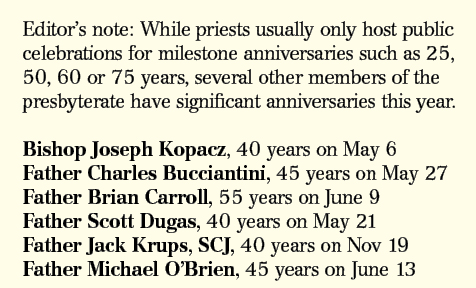By Bishop Joseph Kopacz
I write this week’s column on the weekend of my 40th anniversary of my ordination to the priesthood on May 7th 1977. During quieter moments, and while at the altar during liturgical celebrations, I am stirred by the grace of wonder and awe that 40 years have passed, and the Good Shepherd has led me through the endless mountains of northeastern Pennsylvania, in the Diocese of Scranton into the Deep South in the Diocese of Jackson, Mississippi. After nearly thirty-six and a half years there, and nearly three and a half here, I am happy to be alive and well, capable of memory and gratitude, and able to serve with motivation and purpose.
The 40-year and 40-day time frames in the Bible represent sacred time, kairos, when God and his people walk together (or float in Noah’s time) in the unfolding mystery of salvation. It’s a time of purification, regeneration, and the joyful hope of something new on the horizon. For the Christian, the waters of the flood prefigure the cleansing waters of Baptism and a 40-day period that is closely associated with the season of Lent. Once on dry land, the rainbow arching through the clouds was the sign of the Covenant between God and humankind, and the promise of new life. In my brief time here, a new day has dawned and I have known the abundant life that the Good Shepherd promised in the gospel reading this weekend. Moreover, with the pounding rainstorms that I have experienced since moving to the South, multiplied by 40 days and nights, I could envision the construction of an ark on every corner.
In the Exodus experience, we have the dual time periods of 40 years and 40 days. The Israelites wandered for 40 years in the desert, and Moses spent 40 days and 40 nights on Mount Sinai that brought about the gift of the Ten Commandments, the heart of the Torah, and the sign and substance of the evolving Covenant between God and the Israelites. These tablets of stone were made and adopted early on in the desert sojourn and set the standard for relationship building that God required of the Israelites before opening the door to the land promised to Abraham and Sarah and their descendants. And so, I reflect on the 40 years of preparation that the Israelites underwent, and in a very real way I savor all of the experiences of my priesthood as grist for the mill that the Lord has used to strengthen my relationship with him, and to serve now as the 11th bishop of Jackson. A lesson learned is that God can redeem and transform all of our faithful labors and vain endeavors in order to accomplish his will.
Likewise, I feel confident in drawing a parallel between the 40 days that Moses spent on Mount Sinai, and the 40 days that Jesus endured in the desert in anticipation of his public ministry with my ministry in the Diocese of Jackson. When Moses came down from the mountain he knew that God, who is merciful to the 1,000th generation, was a faithful God, and would be with them always. The golden calf was a substantial pothole along the way, but it was successfully traversed. The Israelites now had a sacred mission and vision with clear pastoral priorities. (You know where I am going with this.) Likewise, when the Holy Spirit led Jesus out of the desert he launched the sacred mission of the New Covenant to be established in his blood, rooted in the prophecy of Isaiah. “The Spirit of the Lord is upon me because he has anointed me to preach the gospel to the poor… and announce a year of favor from the Lord (Luke 4,18ff). In the same vein, the Holy Spirit has anointed and empowered the Body of Christ in our diocese with a renewed sacred mission and vision that is embodied in our pastoral priorities.
This is the life of the New Covenant in the Lord’s blood for me as I travel and serve throughout the diocese. God is renewing my zeal as I see the wisdom of our Vision: to serve others, to inspire disciples, to embrace diversity at every turn in the road. This evening will be my 12th of 23 celebrations of the Sacrament of Confirmation and the diversity of the gifts and ministries in the church, the call to discipleship, and the mandate to serve are alive and well in our young disciples.
The newly confirmed are the living stones who represent the labor of faith, hope and love that happens daily in their families and parishes across the expanse of our 65 counties in Mississippi.
The Vision also is realized in our schools and faith formation programs, through Catholic Charities and Saint Dominic’s, through a myriad of social services and advocacy for a more just social order. For me, the work of pastoral planning over the past year-and-a-half has allowed the Holy Spirit to nudge us forward with greater purpose and passion for the work of the Gospel in the Catholic Church for the salvation of all. It roots us deeply in the Bible and the words of the prophet Micah come to mind as a lamp for our feet. “God has shown you, O mortal, what is good. And what the Lord requires of you? To act justly, to love mercy, and to walk humbly with your God.” (Micah 6:8).
At 40, I am grateful to all who faithfully pray for me daily in the Eucharistic prayer at Mass, via the rosary, and in a host of other ways because my zeal and desire to serve remain strong. This is a gift from the Lord, the Good Shepherd, the fruit of prayer. As we are fond of saying in these parts, I am blessed. “Being confident of this, that he who began the good work in you (us) will bring it to completion on the day of Christ Jesus.” (Phil. 1:6).
Category Archives: Diocesan News
After delay for surgery, Bishop Kihneman takes helm of Biloxi diocese
By David Tisdale
BILOXI – For those in the capacity crowd attending the installation of Bishop Louis F. Kihneman III as the new bishop of the Diocese of Biloxi, the general sentiment was he’s well worth the wait.
Bishop Kihneman, 65, former vicar general of the Diocese of Corpus Christi, Texas, was appointed by Pope Francis to replace retired Bishop Roger P. Morin and was supposed to be ordained and installed in February. However, the ceremony was delayed while the new bishop recovered from surgery for diverticulitis.
Bishop Morin welcomed his successor near the start of Mass in the Nativity of the Blessed Virgin Mary Cathedral. He told Bishop Kihneman he hoped the memory of the installation, the prayers for his success from the people who attended the ceremony, and the celebration to follow would “be a source of support for you in the years ahead.”
Prior to his reading of the pope’s letter announcing the selection of Bishop Kihneman, Archbishop Christophe Pierre, apostolic nuncio to the United States, called on the new church leader to be a “father, pastor and good shepherd, a brother who, in his faithful episcopal ministry, will continue to build up this portion of the Lord’s flock into a vibrant communion of charity.”
Archbishop Thomas J. Rodi of Mobile, Alabama, who served as the second bishop of Biloxi after it was created from the Diocese of Jackson, offered Bishop Kihneman encouragement during his homily. He cited the liturgy’s reading from the first book of Kings in which God exhorts Elijah to help turn people’s hearts to God and gave the new bishop a similar charge.
“God sends you, my brother, Louis. In this age where, as in the time of Elijah, many have turned from God, he sends you to renew the faith of the people. Into an increasingly secular and disbelieving society, he sends you to shepherd his people as bishop of Biloxi,” the archbishop said.
“There will be joyful times as you serve as a bishop,” he said. “There will be grace-filled successes and uplifting moments. May you know many of these moments and may you savor them. But there will also be times when you, as did Elijah, may want to flee from your ministry and tell God this is too much. You, like the apostles in the Gospel of Luke just proclaimed, may want to stop fishing because of disappointing results.”
Archbishop Rodi continued, “In those times the message of God to you will be the same as the message to Elijah: ‘Go back!’ And the same as to the apostles in today’s Gospel: ‘Put out into deep water and lower your nets again for a catch.’ Renew the faith of your people.”
During the ordination ceremony, Archbishop Rodi asked Bishop Kihneman about his resolve to uphold the faith and discharge his duties as head of the diocese. The archbishop then invited the congregation to stand and pray for the new bishop as he began his ministry of serving the church in a new capacity.
Following the presentation of the Book of Gospels, ring, miter and crozier, both archbishops led Bishop Kihneman to the cathedra, marking his official installation as Biloxi’s fourth bishop.
Bishop Kihneman walked through the cathedral after Communion, greeting people in attendance and in a brief address to the congregation, he offered thanks for the support of his family, friends, and to God for getting him to Biloxi. He also expressed gratitude to the doctors and nurses who aided him in his recovery and to the children of the diocese who sent him get-well cards.
“It’s been quite a journey,” he said.
In thanking his late parents, he humorously remarked that his father was surely looking down and taking note of the timing for the installation.
“I express much love and honor to Pope Francis,” Bishop Kihneman said in thanking the pontiff for choosing him to lead the diocese. “This is a tremendous honor, but also breathtaking at the same time.
“I thank the people of the Diocese of Biloxi for praying for me, and I look forward to working with each of you.
“As I am called to be the bishop, the invitation for us is to take to heart the words of Jesus: ‘Love the Lord your God with all your heart, with all your soul, with all your might and love your neighbor as yourself.’
“We take that as our theme,” Bishop Kihneman said. “We are in his image, we are the body of Christ. My brothers, and sisters, God loves you, I love you. As one of the little signs in our Corpus Christi paper said, ‘From Corpus Christi to Biloxi, with love.'”
(David Tisdale is a freelance writer for Gulf Pine Catholic, the newspaper for the Diocese of Biloxi.)
Bishop Kopacz makes pilgrimage to Saltillo
By Monsignor Michael Flannery
MADISON – There is a Spanish phrase “que pasa?” (what’s happening?). In a way, it sums up the pastoral visit Bishop Joseph Kopacz and I made to the Saltillo Mission March 30 -April 3.
We can report that the good work begun by Father Patrick Quinn in 1969 is flourishing south of the border. There are two Mexican priests serving at the mission, Fathers David and Elevio. Both have a profound missionary spirit and they follow in the footsteps of Father Quinn.
We flew into Monterrey, Mexico, on Thursday, March 30. Father David was there to greet us and bring us to the mission about two hours away. He had a full schedule prepared for us. Our first visit was to the church of Cristo Rey (in the city of Saltillo) at 6:00 p.m. It is one of four churches in town served by San Miguel. The other three are; the Holy Martyrs, St. William and Christ the King. We visited other churches in the city the next day.
Saturday we set out for the village Jalapa where the villagers gathered to greet the Bishop from Mississippi. After a prayer service with the rancheros and the distribution of bags of cornmeal we set out for the village of Animas where we shared another meal with the villagers. At 2:00 p.m. we were on the road again to our most distant village of El Tapon, five hours away. There we greeted the people and Bishop Kopacz was asked to bless the seeds of corn and pinto beans to be used for sowing. Also, he was asked to bless the two goat herds. Many coyotes attack and kill the young kid goats and the blessing of the bishop was to provide protection.
After the blessing, Bishop Kopacz was offered a kid goat as a gift. I explained to the kind lady making the offer we would only be in the country five days and were forbidden to bring a goat back with us to the U.S. Instead she offered Bishop Kopacz a package of tortillas which he graciously accepted.
The next morning we went to the village of Garambullo, where we were greeted by a presentation of Aztec dancing before Mass. Father David showed us the new tin roof he had put on the church. Many of the churches in the mountain villages are in bad need of repair. An average roof on a mountain village church costs about $3,000. I had brought a suitcase full of T-shirts, a gift from Madison St. Anthony School. It was amazing to see the joy in these childrens faces as they received them. I also had brought with me 500 ball-point pens which I selectively distributed to other children telling them the pen was a gift of Bishop Kopacz.
When we arrived at La Ventura about 500 villagers were completing a live way of the cross. It was a very moving site. Because of their Mexican heritage and culture, the people relate very well to the suffering Christ. Bishop Kopacz was again front and center celebrating Mass and administering the sacrament of Confirmation.
After Mass, we had a delicious lunch with the villagers. Father David showed Bishop Kopacz a building attached to the church, consisting of two rooms, where it would be possible to house catechists who spend weekends training village catechists and performing missions throughout the year. He had plans to add another floor to the existing two rooms as La Ventura was a central village from where 6 other villages could be served.
It was now time to head back to Saltillo for dinner with the Bishop of Saltillo Don Raul Vera. Bishop Vera was very gracious and Bishop Kopacz shared with him his Pastoral Priorities and Vision for the Diocese of Jackson. The following morning, we shared a light breakfast with Father David and Father Evelio. Both priests are great visionaries and are addressing the needs of the people. Another example of their thinking outside the box, is a project now in its infancy.
San Miguel has become home to four students coming from mountain villages who cannot afford room and board while studying at the university. In exchange for room and board they accompany the priests during the weekend in their ministry in the ranchos. This project costs approximately $2,500 per student, however, that is where the church needs to be offering its services to those in need and changing the lives of people for the better.
Another worthy program at San Miguel is the catechetical program. Young catechists are brought in from remote villages to stay at San Miguel for a week or two during the summer. The rancheros are very moved by this experience. For the first time in their lives they have meals served to them by someone else. Also, they have the experience of taking a shower. That is not an option in the ranchos. It is a different world there at San Miguel.
I would like to end with one quick story. There was one four-year-old girl in Saltillo who got my last St. Anthony T-shirt. She was so excited with her new found treasure she would not take it off. The T-shirt would have fit a child of 12. It was so long it came down to her ankles. Her mother told me later that she would not take it off even to go to bed and she used it as her night gown. I also gave her the St. Anthony golf cap I was wearing. She even wore it to bed she was so overcome with joy with her gift. I can assure you that the people of Saltillo are most appreciative of all that Mississippians do for them and they wanted us to express their gratitude to you.
(Editor’s note: Msgr. Flannery is working on a book detailing the history of the Saltillo mission. a longer version of this story with details of all the rancho visits is available online at www.mississippicatholic.com)
Bishop grateful for support from faithful
By Bishop Joseph Kopacz
(Editor’s note: Bishop Kopacz and the priests of the diocese are on retreat. In lieu of a column, he offers his homily from the Chrism Mass.)
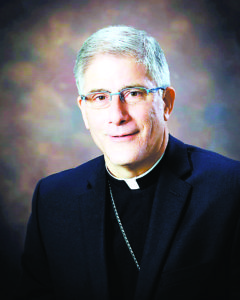 The traditional Gospel on Monday of Holy Week recalls the story of Mary’s anointing of the feet of Jesus at their home with Martha and Lazarus present, along with many of Bethany’s Jews. Mary, once again at the feet of Jesus, this time lavishly anoints her Lord and dear friend and dries his feet with her hair. This anointing, as Jesus foretold in anticipation of his death, would be remembered forever. It is a fitting prelude to today’s Chrism Mass.
The traditional Gospel on Monday of Holy Week recalls the story of Mary’s anointing of the feet of Jesus at their home with Martha and Lazarus present, along with many of Bethany’s Jews. Mary, once again at the feet of Jesus, this time lavishly anoints her Lord and dear friend and dries his feet with her hair. This anointing, as Jesus foretold in anticipation of his death, would be remembered forever. It is a fitting prelude to today’s Chrism Mass.
Today this Scripture is fulfilled in our hearing because the Oil of Catechumens and the Oil of the Sick are blessed, and the Oil of Chrism is consecrated in order to flow from our cathedral, to all parts of the diocese, to be lavishly applied to the Body of Christ, the Church, during Baptism and Confirmation, to begin in several days at the Easter Vigil, for the anointing of the sick, for Holy Orders, and the consecration of altars and churches.
Mary’s astonishing gift of anointing for the Lord is also a sign of the great love that the people of God, the faithful, have for priests, who have been set apart in Holy Orders in order to serve in the church for the salvation of all. This service is accomplished in myriad ways in the course of a day, in the course of this past year, in the course of a lifetime, and people are grateful. Whether in the power of the Sacraments, Baptism, Confirmation, Eucharist, Marriage, and the Anointing of the Sick, or in loving service and leadership, the people of God are grateful. Just recently, someone asked me, “what more can we do for our priests who sacrifice for us?” One answer was to pray for them, another said: ‘tell them of your gratitude’, another response was ‘write them a check’, but post date it until after Christ comes again so that their reward will be great in heaven.
In nearly 40 years as a priest and, including a little more than three years as a bishop, I have known the generosity of the faithful that continues to amaze and inspire me. One extraordinary example. Last week I made my annual pilgrimage to Saltillo, Mexico, accompanied by Padre one, Msgr. Flannery, to further the relationship of nearly 50 years between Jackson and Saltillo that took root with Father Paddy Quinn. We were out in the rancho of Tapon, as remote a place as you can imagine, and the people asked me to bless their newborn goats. That was a delight and they were so grateful that one woman wanted me to take one of the goats as a special gift. The restrictions of customs, airport security, international flights, were not remotely on her radar. It was simply a sign of her gratitude and it radiated in her eyes. Could you see me telling the Customs agent that it may look like a live baby goat, it may sound like one, it may even smell like one, but it really is a battery powered stuffed animal baby goat. Sadly, I could not take the goat.
Whether it’s Mary, the sister of Martha and Lazarus 2,000 years ago, in Bethany, or Maria two weeks ago, on the remote rancho, they represent the loving gratitude that you have for the priesthood and for your priests. We want and need your faith and prayers, and even more, a very special gift, is to experience your growth in holiness, in faith, hope and love as disciples, due in part because of our vocation as priests.
This is the unity we all know through faith and baptism, to be renewed at Easter, the common priesthood of Jesus Christ that all the baptized experience flowing from his side on the Cross, a Kingdom of priests as the reading from the Book of Revelation proclaimed today. All of us are anointed to further the Lord’s mission that we proclaimed in the Word of God today. We bring the Good News to the poor in ever ancient and in ever new ways, and with Pope Francis we challenge the social order wherever it oppresses the vulnerable and powerless.
Inspiring images in my mind these days have been the gatherings for the enactment of our Pastoral Vision and Priorities, beginning at the Duncan Grey Center with priests, and deacons, Lay Ecclesial Ministers and Chancery officials, and continuing at the recent sessions around the diocese.
The Spirit of the Lord is upon us, anointing us, and sending us to be living witnesses of our salvation and mission in Jesus Christ. This Chrism Mass assembly embodies our unity, our mission, our vision and our dreams for our diocese, 180 years young this year.
In preparation for the renewal of our priestly promises I want to call upon the wisdom of our most recent Holy Fathers.
In his final Chrism Mass Homily in 2004, Saint John Paul II offered these words.”The today of the Gospel’s fulfillment is renewed in a very special way during the Chrism Mass which is a true prelude to the Easter Triduum. If the Mass of the Lord’s Supper accentuates the mystery of the Eucharist and the presentation of the new commandment of love, the Chrism Mass gives prominence to the gift of the ministerial priesthood. The Eucharist and the priesthood are two sacraments born together, and their destiny is indissolubly linked until the end of the world.”
The faithful of the Diocese of Jackson echoed these words throughout the past year during the process of pastoral planning when they expressed their love for the Eucharist and the priesthood, and how important it is to create a culture of vocations that will inspire a generosity to hear the call of the Lord in the priesthood.
Pope Benedict, in his final Chrism Mass homily in 2012 recalled Jesus’ great priestly prayer of departure from this world in Saint John’s Gospel to further reflect upon the gift of priesthood that the Chrism Mass presents. The power of truth, mission, and unity is evident in Jesus’ words. “As you sent me into the world, so I send them into the world. Consecrate them in the truth. I pray not only for them, but also for those who will believe in me through their word, so that they may all be one. Father, they are your gift to me.”
Pope Benedict asks: But what does it mean to be consecrated in truth? He says:
“We need, I need, not to claim my life as my own, but to place it at the disposal of another, of Christ. I do not own myself, and I become myself by the very fact that I transcend myself, and thereby become a part of Christ, a part of his body the Church. No one should ever have the impression that we work conscientiously when on duty, but before and after hours we belong only to ourselves. A priest never belongs only to himself. People must sense our zeal through which we bear credible witness to the Gospel of Jesus Christ.”
Pope Francis, during his homily to priests and religious during World Youth Day in Poland last year spoke in the same vein, recalling the words of Saint John Paul.
“Open wide the doors to Christ and the hurdles associated with it. We can often be tempted to remain enclosed, out of fear or convenience. But Jesus directs us to a one-way street, that of going forth from ourselves, a one-way trip with no return ticket, setting out on the path of self gift. Nor does Jesus like journeys made halfway, doors half closed. He asks us to pack lightly for the journey, to set out renouncing our own security, with him alone as our strength, not limited to trails already blazed, but open and faithful to the paths pointed out by the Spirit in whom we have been anointed.”
The Church now asks you to pray for me and my brother priests as we renew our commitment begun on our ordination day. Pray that the Holy Spirit may stir into flame the gift of God that all of us received in the Sacrament of Holy Orders that we may continue to respond as self-gift in the footsteps of our Lord, for God’s glory and the salvation of all.
Retiring priests look forward to rest
By Mary Margaret Halford
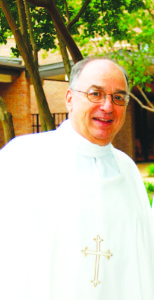
Father Messina
For Father Sam Messina, priesthood has been all about the people. From fostering young minds as a teacher in Catholic schools to working as a hospital chaplain who counseled people at the end of their lives, Messina has seen it all. And after 52 years as a priest, the 78-year-old is retiring.
“I just love people, and I love a challenge,” Messina said, noting that he could have retired eight years ago, but just wasn’t ready to hang it up then. “But I just knew it was time.”
After being ordained in Ohio in 1965, the Greenville native made his way back to Mississippi, where he got his start in Hattiesburg, teaching Latin and theology at Sacred Heart. From there, he went to Greenville, where he also taught, and then to Vicksburg as the parish priest at St. Michael. He also served in Chatawa, where he was chaplain at an all girls school, as well as the priest of churches in Osyka and Magnolia. He then did stints in West Point and Natchez, before going back to Vicksburg as the chaplain of Mercy Hospital. After 12 years as parish priest in Belzoni, he ended his career with 13 years in Batesville/Sardis.
Messina has countless fond recollections of his service across Mississippi, but his time spent working in the hospital evokes some special memories.
“Although it’s difficult work, I thoroughly enjoyed it,” Messina said, adding that once, he made 150 visits in just a day. “It was 24/7, you were expected to answer calls and minister to people at all times.”
One day while having lunch, Messina’s beeper went off, paging him to the emergency room. As he rushed into the ER, he heard a mother tell her ailing child “You’ll be alright, look, here comes Father Sam.”
“The more I worked, the more I loved it,” he said.
Though Father Sam has retired to St. Catherine’s Village in Madison now, his love of people is stronger than ever.
“I’ve already been called on to do different ministries here,” he said. “We have daily Mass, and I’ll always be here to counsel people. I do like to fish, and they don’t lack things to do here if you’re capable of doing them. I’m getting settled – so far, so good.”
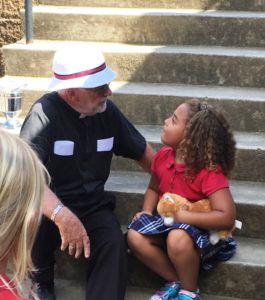
Father P.J. Curley speaks to Rian Harris at Vicksburg Catholic School in this file photo. (Photo courtesy of Ann Roberson)
From the time that Father P.J. Curley came to the United States from his home of Roscommon, Ireland, he’s been consistently pleased with how well people have treated and accepted him, both because of and despite his humorous side.
Throughout his career as a priest – which is nearing the 47-year mark – Father Curley has made connections with parishioners across the state.
“I think that no matter where I’ve been, as far south as Biloxi and as far north as Shelby, everybody was continually friendly and kind and loving,” Father Curley said. “I’d say 99 percent of the people were gracious enough to accept silliness as part of my personality.”
Father Curley began his priesthood on the southern end of the state in Biloxi before moving to Jackson. He then went south again to Woodville, which had a mission at Fort Adams. From there, Father Curley moved north to Shelby, and he also served in Belzoni, which had a mission at Anguilla. His last two stops were Yazoo City and finally, St. Michael in Vicksburg.
And of all his experiences in those assignments that spanned the state, Father Curley said he’ll miss preaching the most. “I just love preaching, probably because nobody listens,” he said with a laugh “But really, I love preaching; and I love liturgy; I love Eucharistic celebrations.”
And as for retirement, his big plan is to just soak it in.
“I intend to enjoy myself, that’s what I’m going to do,” he said. “I’ll be living in Vicksburg and helping out anywhere I’m needed.”
Not long before Father Curley sat down to draft his letter of retirement to Bishop Kopacz, he came across a poem that struck him when he thought about parishioners missing him in retirement.
When you’re feeling so important and your ego is in bloom,
When you simply take for granted you’re the wisest in the room,
When you feel your very absence will leave a great big hole,
Just follow these instructions, they will humble any soul.
Take a bucket filled with water, put your hand in to the wrist,
Pull it out, and the hole remaining is how much you will be missed.
“Anytime I think about people missing me, I remember this poem,” he said. “And I just ask the people of God to pray for me.”
(Mary Margaret Halford is a member of Vicksburg St. Paul Parish)
Spring Hill College to offer
Spring Hill College’s Summer Institute of Christian Spirituality will offer a course on Walker Percy’s “Tarnished Woman of Grace” during our first session (June 5-9) on the campus in Mobile. The course will focus on Percy’s later book, “The Second Coming,” a book about suicide, testing God, faith and redemption (through the grace of a woman escaped from an insane asylum). The course will be 5 days, each morning from 9-11 a.m.
Walker Percy, born in Alabama, growing up in Mississippi, and living and writing in Louisiana, is one of the great Southern Catholic writers (He was an adult convert to Catholicism). He became known as a “Southern Catholic writer” when he wrote the essay “Stoicism in the South” in 1956 for Commonweal, condemning southern segregation and advocating a new kind of Christian philosophy in Southern life.
His most famous book, “The Moviegoer,” published in 1960 won the National Book Award. In 1989, the University of Notre Dame awarded Percy its Laetare Medal, which is bestowed annually to a Catholic “whose genius has ennobled the arts and sciences, illustrated the ideals of the Church, and enriched the heritage of humanity.” Walker Percy was buried on the grounds of St. Joseph Benedictine Abbey in St. Benedict, LA.
About the course, Dr. Katherine Abernathy says, “I would say that Christians in the South should read Percy because they will find a fresh look at their faith. He is irreverent and hilarious, yet his response to spiritual despair is Catholic at its depth.”
Dr. Katherine Abernathy is an associate professor of English at the University of Mobile where she has taught since 1997. She earned her Ph.D. from the University of Dallas in 2000. Her research interests have focused on Southern literature, especially Walker Percy and Caroline Gordon, and she is currently working on a study of the works of the modern Norwegian novelist Sigrid Undset.
For more information on the Summer Institute of Christian Spirituality at Spring Hill College go to www.shc.edu/sics or call (877) 857-6742.
Immigrant advocates seek pro-bono attorneys through conference
By Elsa Baughman
JACKSON – The Mississippi Bar’s Young Lawyers Division (YLD) and the Mississippi Access to Justice Commission recently joined forces to offer a seminar focused on children’s immigration issues. Gathered at the Mississippi Supreme Court on Friday, April 7, 73 participants, the majority lawyers and a few religious, heard several panelists address issues mainly concerning two common immigration protections for vulnerable immigrant children: the Special Immigrant Juvenile Status and asylum.
During the welcoming remarks, Tiffany Graves, a lawyer from the Mississippi Access to Justice Commission, noted that there are not many legal aid programs in the state that focus on immigration issues and they are fortunate to have Catholic Charities doing this work but they need some help.
She said one of the aims behind the seminar was to educate attorneys on how to help pro bono with immigration cases. “We hope you leave inspired to help in your communities,” she told those present.
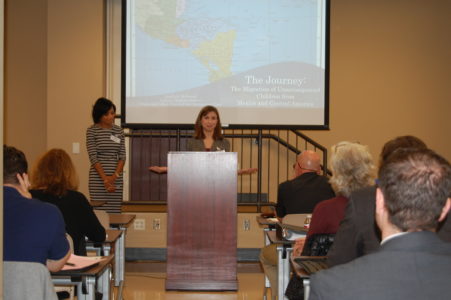
JACKSON – Kaytie Picket, Young Lawyers Division board of directors, welcomes participants to a day of education about immigration while Tiffany Graves from the Mississippi Access to Justice Commission looks on. (Photo by Elsa Baughman)
Kaytie Pickett, a lawyer and member of the YLD board of directors, said at the beginning of the conference that she had been thinking about pro bono opportunities in Mississippi. “Immigration is something I want to address but I don’t know anything about it,” she said.
She wanted to find ways to train lawyers in immigration work. Pickett heard about Amelia McGowan, an attorney at the Migrant Support Center of Catholic Charities. Pickett contacted McGowan and the seeds for the conference were planted. “Kids Seeking Safety: An Intro to Children’s Immigration issues,” was the theme.
Catholic Charities and the Mississippi College School of Lay Immigration Clinic were also sponsors of this seminar. As a result of this presentation, Catholic Charities hopes to place cases of children in need with pro bono counsel.
McGowan’s presentation, “The Journey: Background on Migration of Children and Families from Central America,” addressed why so many children migrate to the United States, what kind of problems they face in their own countries and here in the U.S. when they arrive. Seventy-four percent of these children are from El Salvador, Guatemala and Honduras. She said in Mississippi approximately 300 children arrive each year. They are usually released to family members and if they don’t have a family member they are placed with foster parents.
“Often, children represent the most dire cases, representing the most vulnerable clients in immigration courts,” she said, explaining that when a child is apprehended in the border that child is place in a deportation proceeding and in most cases they are not given the right counsel. “That is where your participation is important,” she said.
The seminar included seven presentations that address such issues as asylum and its application process. The keynote address was by Judge Leslie Southwick from the U.S. Court of Appeals 5th Circuit.
Patrick Fields, a law student at the Mississippi College School of Law, said that a lot of time people who are outside the practice don’t understand the gravity of what these children have lived through and don’t comprehend the profound nature of the obstacles they have already overcome and the ones they have before them. “I think that to inform people of that and show them a humane face to this dynamic that they just read about it in the paper it was a really good thing.” Fields said that the overview that McGowan presented about how this process looks like for a lot of these kids may compel the lawyers attending to search their hearts in regards to this issue and consider getting involved.
Courtney Hunt, a lawyer with the Forman Watkins & Krutz said the conference was an eye opening for her. “I hear about these issues in the news but learning a little bit more about what is causing children to end up here in Mississippi and the United States is very important to me,” she said. Her firm has a pro bono partnership with Catholic Charities to do immigration work. “I am excited to be able to be involved in an area in which I can play a little part.”
“I am thrilled to see us calling attention to the children who are here in this country suffering because of the immigration laws,” said Redemptorist Father Michael McAndrew. He said that calling attention to this children will hopefully give people to also look later at the many citizen children who have undocumented parents. “Here in Mississippi we have a need to see the faces of these children and realize that we are a country of immigrants and we need to value them,” Father McAndrew noting that whatever opportunities we give to these children God blesses our country.
Charities tournament benefits
JACKSON – Catholic Charities hosted its annual Charity Tennis Tournament March 30-April 7 at River Hills Club. One unique feature of this event is Kid’s Day, held this year on Wednesday, April 5.
The day began early when 55 students from Rowan Middle School arrived at River Hills. They were all wearing matching Kids Day t-shirts made for the event. USTA officials gave the students an overview of the game of tennis. They were then joined by students from the Brinkley Junior High tennis team.
The interesting thing about the Brinkley group is that they are part of a newly formed team made up of members who were introduced to tennis for the first time at this very kids day event during the past two years.
Soon after instuction, all the students watched as the ladies on the pro-circuit competed. They then moved to an hour of on-court instruction provided by both pro circuit players and local tennis pros. From there the enjoyed lunch at the club while hearing from a local speaker.
The tournament consists of pro-am play as well as Catholic Charities events, dinners and luncheons every day. Money from this tournaments goes to children’s programs at Charities. This year’s winner was Barbara Haas from Austria.

Bishop Joseph Kopacz congratulates the singles winner, Barbara Haas from Austria. (Photos submitted by Julie O’Brien)
Risen Christ calls all to follow him on path to life, pope says
By Cindy Wooden and Junno Arocho Esteves
VATICAN CITY (CNS) – Jesus is the risen shepherd who takes upon his shoulders “our brothers and sisters crushed by evil in all its varied forms,” Pope Francis said before giving his solemn Easter blessing.
With tens of thousands of people gathered in St. Peter’s Square April 16, the pope called on Christians to be instruments of Christ’s outreach to refugees and migrants, victims of war and exploitation, famine and loneliness.
For the 30th year in a row, Dutch farmers and florists blanketed the area around the altar with grass and 35,000 flowers and plants: lilies, roses, tulips, hyacinths, daffodils, birch and linden.
Preaching without a prepared text, Pope Francis began — as he did the night before at the Easter Vigil — imagining the disciples desolate because “the one they loved so much was executed. He died.”
While they are huddling in fear, the angel tells them, “He is risen.” And, the pope said, the church continues to proclaim that message always and everywhere, including to those whose lives are truly, unfairly difficult.
“It is the mystery of the cornerstone that was discarded, but has become the foundation of our existence,” he said. And those who follow Jesus, “we pebbles,” find meaning even in the midst of suffering because of sure hope in the resurrection.
Pope Francis suggested everyone find a quiet place on Easter to reflect on their problems and the problems of the world and then tell God, “I don’t know how this will end, but I know Christ has risen.”
Almost immediately after the homily, a brief but intense rain began to fall on the crowd, leading people to scramble to find umbrellas, jackets or plastic bags to keep themselves dry.
After celebrating the morning Easter Mass, Pope Francis gave his blessing “urbi et orbi,” to the city of Rome and the world.
Before reciting the blessing, he told the crowd that “in every age the risen shepherd tirelessly seeks us, his brothers and sisters, wandering in the deserts of this world. With the marks of the passion — the wounds of his merciful love — he draws us to follow him on his way, the way of life.”
Christ seeks out all those in need, he said. “He comes to meet them through our brothers and sisters who treat them with respect and kindness and help them to hear his voice, an unforgettable voice, a voice calling them back to friendship with God.”
Pope Francis mentioned a long list of those for whom the Lord gives special attention, including victims of human trafficking, abused children, victims of terrorism and people forced to flee their homes because of war, famine and poverty.
“In the complex and often dramatic situations of today’s world, may the risen Lord guide the steps of all those who work for justice and peace,” Pope Francis said. “May he grant the leaders of nations the courage they need to prevent the spread of conflicts and to put a halt to the arms trade.”
The pope also offered special prayers for peace in Syria, South Sudan, Somalia, Congo and Ukraine, and for a peaceful resolution of political tensions in Latin America.
The pope’s celebration of Easter got underway the night before in a packed St. Peter’s Basilica.
The Easter Vigil began with the lighting of the fire and Easter candle in the atrium of the basilica. Walking behind the Easter candle and carrying a candle of his own, Pope Francis entered the basilica in darkness.
The basilica was gently illuminated only by candlelight and the low light emanating from cellphones capturing the solemn procession.
The bells of St. Peter’s pealed in the night, the sound echoing through nearby Roman streets, announcing the joy of the Resurrection.
During the vigil, Pope Francis baptized 11 people: five women and six men from Spain, Czech Republic, Italy, the United States, Albania, Malta, Malaysia and China.
One by one, the catechumens approached the pope who asked them if they wished to receive baptism. After responding, “Yes, I do,” they lowered their heads as the pope poured water over their foreheads.
Among them was Ali Acacius Damavandy from the United States who smiled brightly as the baptismal waters streamed down his head.
In his homily, reflecting on the Easter account from the Gospel of St. Matthew, the pope recalled the women who went “with uncertain and weary steps” to Christ’s tomb.
The pope said the faces of those women, full of sorrow and despair, reflect the faces of mothers, grandmothers, children and young people who carry the “burden of injustice and brutality.”
The poor and the exploited, the lonely and the abandoned, and “immigrants deprived of country, house and family” suffer the heartbreak reflected on the faces of the women at the tomb who have seen “human dignity crucified,” he said.
However, the pope added, in the silence of death, Jesus’ heartbeat resounds and his resurrection comes as a gift and as “a transforming force” to a humanity broken by greed and war.
“In the Resurrection, Christ rolled back the stone of the tomb, but he wants also to break down all the walls that keep us locked in our sterile pessimism, in our carefully constructed ivory towers that isolate us from life, in our compulsive need for security and in boundless ambition that can make us compromise the dignity of others,” he said.
Pope Francis called on Christians to follow the example of the woman who, upon learning of Christ’s victory over death, ran to the city and proclaimed the good news in those places “where death seems the only way out.”
Presiding over the Stations of the Cross Good Friday, April 14, at Rome’s Colosseum, Pope Francis offered a prayer expressing both shame for the sins of humanity and hope in God’s mercy.
A crowd of about 20,000 people joined the pope at the Rome landmark. They had passed through two security checks and were watched over by a heavy police presence given recent terrorist attacks in Europe.
At the end of the service, Pope Francis recited a prayer to Jesus that he had composed. “Oh Christ, our only savior, we turn to you again this year with eyes lowered in shame and with hearts full of hope.”
The shame comes from all the “devastation, destruction and shipwrecks that have become normal in our lives,” he said, hours after some 2,000 migrants were rescued in the Mediterranean Sea. The shame comes from wars, discrimination and the failure to denounce injustice.
Turning to the sexual abuse crisis, Pope Francis expressed “shame for all the times we bishops, priests, consecrated men and women have scandalized and injured your body, the church.”
But the pope also prayed that Christians would be filled with the hope that comes from knowing that “you do not treat us according to our merits, but only according to the abundance of your mercy.”
Christian hope, he said, means trusting that Jesus’ cross can “transform our hardened hearts into hearts of flesh capable of dreaming, forgiving and loving.”
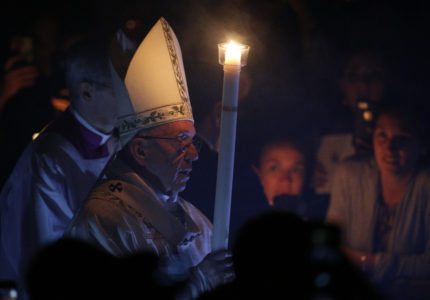
Pope Francis carries a candle as he arrives to celebrate the Easter Vigil in St. Peter’s Basilica at the Vatican April 15. (CNS photo/Paul Haring) See POPE-EASTER-ROUNDUP April 16, 2017.
Three priests plan anniversary celebrations
By Maureen Smith
JACKSON – Three priests will celebrate significant anniversaries in the Diocese of Jackson this year. Father Alfred Camp marks 60 years of the priesthood while Fathers Brian Kaskie and Panneer Arockiam will each celebrate their 25th anniversary.
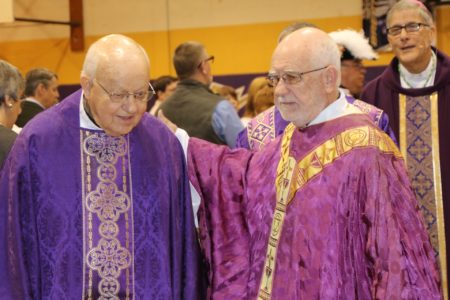
VICKSBURG – Father Camp, left, with Father P.J. Curley in December 2016 when the school named the entrance after Father Camp. (file photo)
Father Camp spent more than four decades in education, some as discipline director at his seminary and another 23 at Vicksburg St. Aloysius School. “I remember one day Sister Virginia called me into her office and said she was leaving and asked if I would finish out the school year (as principal). I thought, ‘well, there’s only six months left,’ so I said yes. I ended up staying on as principal for 18 years,” he joked.
Father Camp also served Clarksdale at St. Elizabeth and Natchez at the Basilica of the Immaculate Conception. He lives at Madison St. Francis of Assisi where he says the pastor, Father Albeenreddy Vatti, pastor, and Father Jason Johnston, associate pastor, take good care of him. “I have enjoyed every bit of it. It has been such a privilege to be a priest,” he said of his years in service.
Father Camp will mark his 60th anniversary of ordination with a Mass and luncheon at St. Francis on Thursday, May 25. The celebration starts at 11 a.m. and all are welcome.
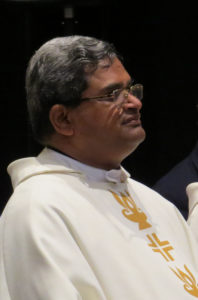
Father Paneer
Father Panneer Arockiam came to Yazoo City St. Mary Parish from India. He said he was very happy to come to America to be a pastor and has felt very welcomed here. Father Panneer started his vocational journey at the age of 13 when he was selected to participate in a vocational camp with other young men. “I was motivated by my parish priest as an altar server. We did so well as servers we were selected for camp,” he said.
The bishop in his home diocese was a visionary who believed in education so between his studies in philosophy and theology, Father Paneer was allowed to go to a local Jesuit university to get a degree in chemistry.
Father Panneer has a real love for ecumenical dialogue. In India, he served as the diocesan and then regional secretary for ecumenism and dialogue. He continues to pursue that work in Yazoo City, “We all believe in Jesus, why should we be divided,” he said. “In Yazoo City there is a ministerial association. I have joined and they call me ‘only Father’ because they call one another pastor,” he joked. “The group unifies us, we are all one family with God as our Father.”
When he was ordained, Father Panneer selected the scripture “into your hands” as a kind of motto. He hopes to be an instrument for God in all his work. On Sunday, June 11, St. Mary Parish will host an anniversary Mass and meal starting at 2 p.m.
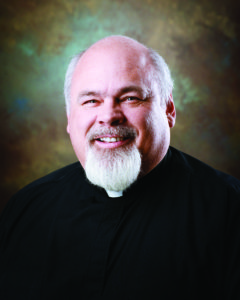
Father Kaskie
Father Brian Kaskie also marks 25 years of ordination this year. The Mississippi native has served in Natchez and at Madison St. Joseph High School for five years. He said he is still on the wedding circuit thanks to that work. Other places he served include Madison St. Francis, the Cathedral of St. Peter the Apostle and his current home of McComb St. Alphonsus Parish.
One of the highlights of his career was getting to be the chaplain for the New Orleans Saints football team when they held their spring camps in Jackson. “Twice I got to be the chaplain for the New Orleans Saints, before they got good. That’s why they got good, I was that good,” he said. Father Kaskie is currently director of seminarians for the diocese. His advice to men discerning their vocation: “Trust God and try to follow the Holy Spirit. It’s not complicated, but it’s hard,” he said.
Father Kaskie’s 25th anniversary celebration will be Monday, June 5, with Mass at 6:30 p.m. and a reception to follow.
